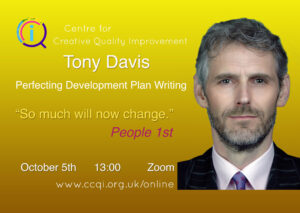The self-assessment improvement plan

This article is a wonderful illustration of why Ofsted gets their recommendations wrong so often.
For many education providers, it’s ‘that’ time of year again when they’re trying to juggle giving new students/learners/apprentices an unmissable induction experience and completing their self-assessment report. Even though I had a great time speaking about this at this morning’s Skills & Education Group network meeting, I know it’s the wrong time of year for this training.
What we did was look at the five key mistakes providers make when completing their SARs. Once authors get their eye in for these issues, they immediately see their own mistakes and often say in the final plenary that they hate me – but in a good way (I hope!) – as they now feel they to have to rewrite their reports. The training ideally needs to be completed just after Easter, but people aren’t thinking about it at that time of year..
One of the reasons I love this work is that I don’t feedback on providers’ writing, I just get them to ‘see’. Once they can ‘see’, they know what they need to do to improve.
Are you ahead of me? If I were to follow Ofsted’s edicts, I’d have to FEEDBACK on every author’s individual report, telling them what to do next. But that would just make them dependent on me, and that’s the last thing I either want or have the time to do. It’s the same approach I advocate for learners: feedback is your last resort – plan A has to be to equip them with an understanding of what ‘quality’ means and give them the skills to critically reflect on, and improve, their own work.
Self assessment and development planning are two completely separate quality processes. Trouble is, many authors conflate the two – jumping to improvement actions before they’ve found the root-cause issue they need to resolve. This has the strong potential to make them: miss the point, fail to improve, introduce bureaucracy, and turn front-line staff off self assessment even more than usual.
The job of self assessment is to learn about your provision. ‘What are the root-cause issues behind the symptoms of underperformance?’ ‘What are the reasons some aspects of your provision are outstanding?’ In short, for every sentence you write, you should ask: ‘What have I just learnt from what I’ve just written?’
The output of the SAR, then, is a series of root-cause issues – never symptoms. These are then plugged into your improvement plan.
However, as with SARs, there are four key mistakes providers make with quality improvement planning, and that’s what we’ll be looking at on October 5th in our next open, online session. And as before, the session will result in delegates absolutely knowing whether their plan is fit for purpose, or whether they’ve missed the point. They’ll also know exactly what to do to put any issues right. If you’d like to join us, then here’s the link for more information: www.ccqi.org.uk/qip.
I’d like to illustrate this with some comments other delegates have said about the session:
- ‘It’s show time! We are ready to step up to the plate.’ Bury College
- ‘Chomping at the bit to discuss changes.’ Grimsby Institute
- ‘Going from ‘standing’ on my head to standing on my feet.’ OxfordSaudia Flight Academy
- ‘The QIP slate has been wiped clean.’ Wirral Metropolitan College
And one of my favourites:
- ‘Marching through the pearly gates of development plan writing heaven.’ Brighton, Hove & Sussex Sixth Form College
Do please join us if you can and tag any of your colleagues who might be interested, and/or share with your own networks if you’re able. Thursday, October 5th, 1pm. Hope to see you then!




Comments
No comments yet